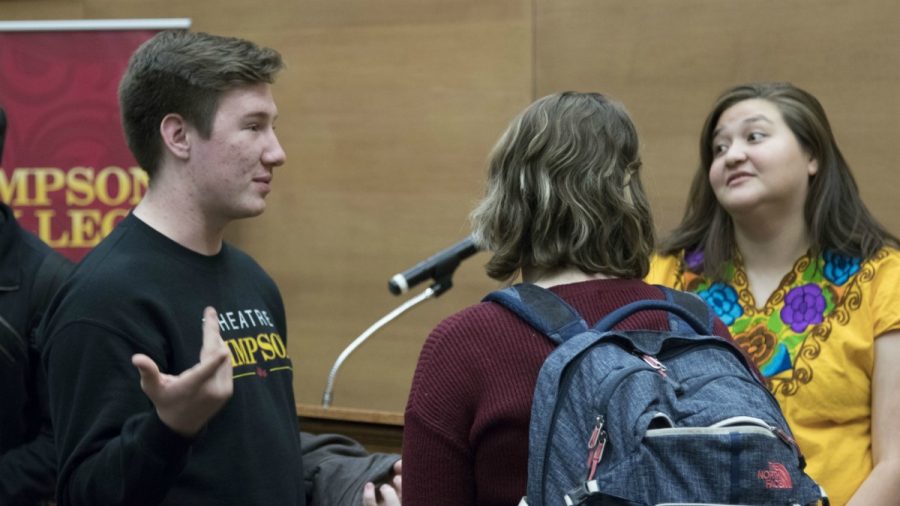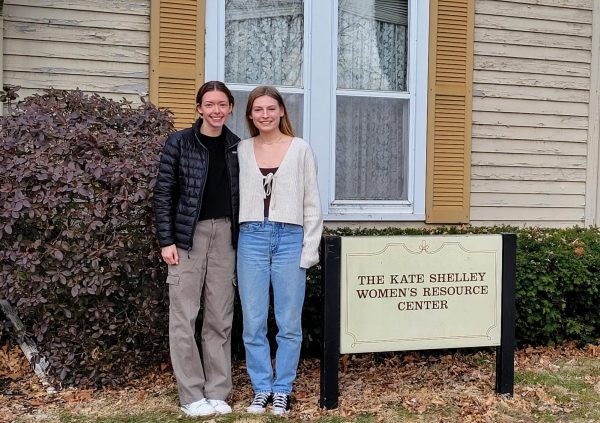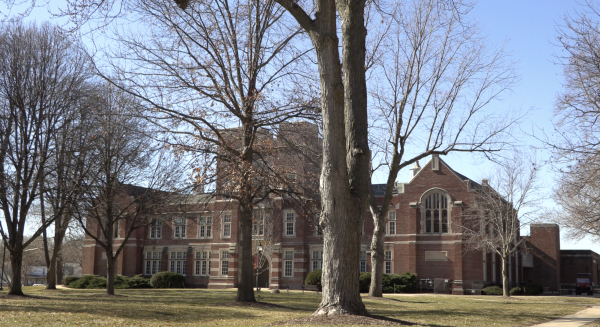Student Government Association holds DACA forum
December 6, 2017
INDIANOLA, Iowa — A Simpson student and a guest speaker spoke Tuesday night about their immigration experiences in light of recent presidential action related to undocumented immigrants to a crowd of about 70 people in Hubbell Hall.
“It’s very important for everyone to know that people who come here undocumented are not, we’re not monsters. We’re not these horrible things we hear on the news,” said Sonia Reyes-Snyder, executive officer for Iowa’s Office of Latino Affairs.
Reyes-Snyder said she came to the United States from El Salvador when she was 16 years old, living first in California before moving to Iowa in 1997. After an earthquake hit El Salvador in 2000, she was granted temporary protected status and thus has a permit to work in the U.S.
Junior Cecilia Martinez also related their story growing up in Iowa as an undocumented immigrant and their experience as a recipient of Deferred Action for Childhood Arrivals, or DACA.
Martinez said their family brought them from northern Mexico to Iowa when they were 6 months old. The reason their family chose Iowa was because of family connections here.
“Growing up, I was not aware of my status,” Martinez said, later saying it wasn’t something their parents told them about when they were young. It wasn’t until one of their older brothers was arrested that Martinez found out when they were around 10 or 11 years old.
Even after Martinez’s brother was arrested and was deported, Martinez said their parents tried to shield them from the reality of what had happened. However, it was when Martinez got to high school and their peers began getting driver’s licenses and college scholarships that the reality of their status became clear.
“It was in that moment that I realized how limited I was in options that I have,” Martinez said. “And so, that was one of the reasons I picked Simpson, since it is a private college, and most all private colleges have the same tuition rate for everybody, whether you’re in-state, out-of-state or international.”
Martinez said they were granted DACA status in August 2015 after applying for it that spring.
“With that came my getting my first ever job, which is a work-study here at Simpson,” they said. “For me, this was amazing. I can make my own money, I can do all this stuff. And it really opened up a lot of doors for me personally.”
Reyes-Snyder said there are approximately 5,000 DACA recipients currently living in Iowa. “That’s a lot of people. A lot of youth, a lot of college students and a lot of workers,” she said.
With President Donald Trump’s announcement in September to phase out the DACA program by next March, Martinez and Reyes-Snyder explained what that means for recipients of the program.
Martinez held up a sign with the number 472 written on it, signifying the remaining days they have until their DACA status expires in late March.
“For me personally, this date falls right in the middle of my senior year spring semester,” Martinez said. “So, for that reason, I am graduating a semester early.”
When asked about the current mood surrounding Congress’ action regarding DACA and future immigration legislation, Reyes-Snyder said: “Right now, really, we’re just holding our breaths. There’s no indication that it’s going to be good.”
She said one thing all people can do to show support for DACA and related legislation is contact their representatives. She told the audience there are several bills in Congress that would simplify the citizenship process for undocumented immigrants, such as the bipartisan DREAM Act introduced in July.
She said she personally supports that bill because it is more inclusive than some of the other proposed bills.
















